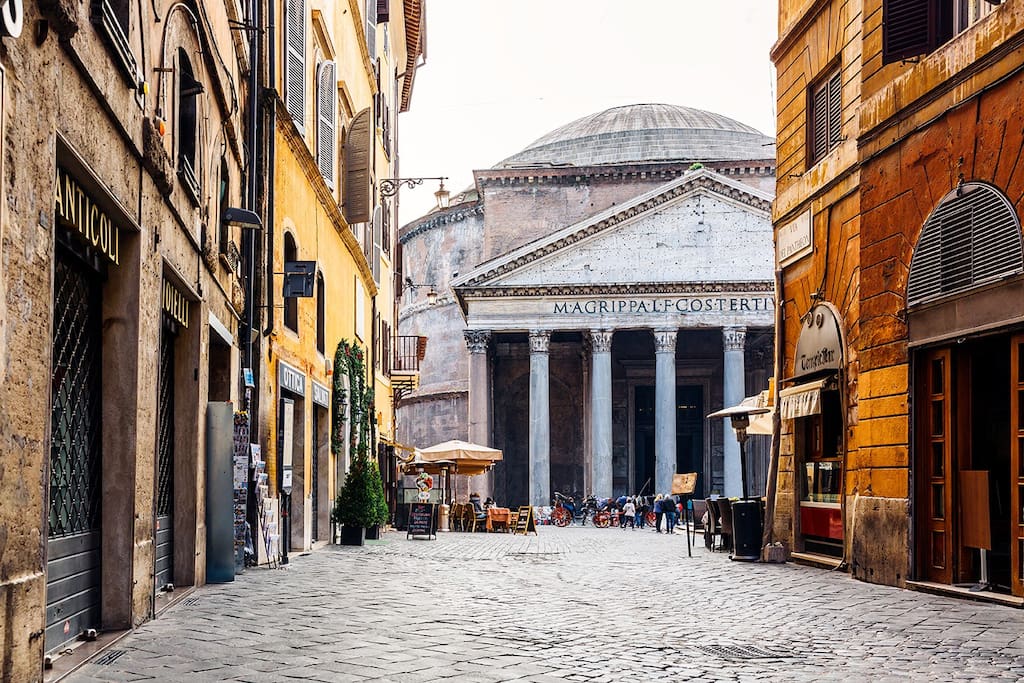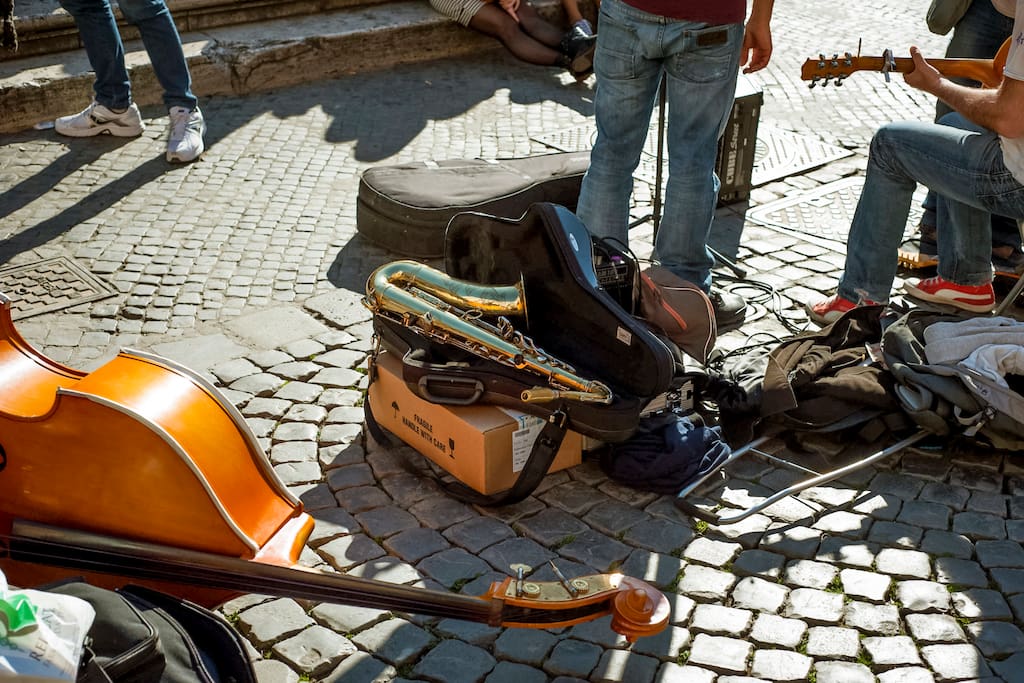Sightseeing
Is an elliptical amphitheatre in the centre, the largest ever built in the Roman Empire, built of concrete/stone. It is considered one of the greatest works of Roman architecture/Roman engineering.
2612 locals recommend
Colosseum
1 Piazza del ColosseoIs an elliptical amphitheatre in the centre, the largest ever built in the Roman Empire, built of concrete/stone. It is considered one of the greatest works of Roman architecture/Roman engineering.
The Palatine Hill is the centermost of the Seven Hills of Rome and is one of the most ancient parts of the city. It stands 40 metres above the Roman Forum.
186 locals recommend
Palatine Hill
Via SacraThe Palatine Hill is the centermost of the Seven Hills of Rome and is one of the most ancient parts of the city. It stands 40 metres above the Roman Forum.
The Capitoline Museums are a group of art and archeological museums, are contained in three palazzi surrounding a central trapezoidal piazza in a plan conceived by Michelangelo Buonarroti in 1536.
427 locals recommend
Capitoline Wolf
1 Piazza del CampidoglioThe Capitoline Museums are a group of art and archeological museums, are contained in three palazzi surrounding a central trapezoidal piazza in a plan conceived by Michelangelo Buonarroti in 1536.
The Pantheon, an adjective meaning "temple consecrated to all gods", commissioned by Marcus Agrippa as a temple to all the gods of Ancient Rome, and rebuilt by Emperor Hadrian in about 126 AD.
1342 locals recommend
Pantheon
Piazza della RotondaThe Pantheon, an adjective meaning "temple consecrated to all gods", commissioned by Marcus Agrippa as a temple to all the gods of Ancient Rome, and rebuilt by Emperor Hadrian in about 126 AD.
The Trevi Fountain: Standing 26 metres (85.3 feet) high and 20 metres (65.6 feet) wide, it is the largest Baroque fountain in the city and one of the most famous fountains in the world.
1461 locals recommend
Trevi Fountain
Piazza di TreviThe Trevi Fountain: Standing 26 metres (85.3 feet) high and 20 metres (65.6 feet) wide, it is the largest Baroque fountain in the city and one of the most famous fountains in the world.
Arts & Culture
The Villa Mattei or Villa Celimontana is a villa on the Caelian Hill in Rome, best known for its gardens. Its grounds cover most of the valley between the Aventine Hill and the Caelian.
268 locals recommend
Villa Celimontana
The Villa Mattei or Villa Celimontana is a villa on the Caelian Hill in Rome, best known for its gardens. Its grounds cover most of the valley between the Aventine Hill and the Caelian.
Colle Oppio Park
Viale del Monte OppioHistoric Park.
The Baths of Caracalla: were Roman public baths, or thermae, built in Rome between AD 212 and 216, during the reign of the Emperor Caracalla. The baths remained in use until the 6th century.
397 locals recommend
Baths of Caracalla
Viale delle Terme di CaracallaThe Baths of Caracalla: were Roman public baths, or thermae, built in Rome between AD 212 and 216, during the reign of the Emperor Caracalla. The baths remained in use until the 6th century.
Is the modern name for the ancient Porta Appia, a gate in the Aurelian Wall of Rome, through which the Via Appia, now the Via di Porta San Sebastiano at that location.
32 locals recommend
Museo delle Mura
18 Via di Porta San SebastianoIs the modern name for the ancient Porta Appia, a gate in the Aurelian Wall of Rome, through which the Via Appia, now the Via di Porta San Sebastiano at that location.
The Mouth of Truthis an image, carved from Pavonazzetto marble, of a man-like face, located in the portico of the church of Santa Maria in Cosmedin.
248 locals recommend
Mouth of Truth
18 Piazza della Bocca della VeritàThe Mouth of Truthis an image, carved from Pavonazzetto marble, of a man-like face, located in the portico of the church of Santa Maria in Cosmedin.
National Monument to Victor Emmanuel II or Altar of the Fatherland, "Il Vittoriano", is a monument built in honour of Victor Emmanuel, the first king of a unified Italy.
337 locals recommend
Altar of the Fatherland
Piazza VeneziaNational Monument to Victor Emmanuel II or Altar of the Fatherland, "Il Vittoriano", is a monument built in honour of Victor Emmanuel, the first king of a unified Italy.
Rome Opera House, originally opened in November 1880 as the 2,212 seat Costanzi Theatre, it has undergone several changes of name as well modifications and improvements. The present house seats 1,600.
141 locals recommend
Teatro dell'Opera di Roma
Piazza Beniamino GigliRome Opera House, originally opened in November 1880 as the 2,212 seat Costanzi Theatre, it has undergone several changes of name as well modifications and improvements. The present house seats 1,600.
Thermae Diocletiani were the grandest of the public baths, or thermae built by successive emperors. Diocletian's Baths, dedicated in 306, were the largest and most sumptuous of the imperial baths.
129 locals recommend
National Roman Museum - The Baths of Diocletian
78 Viale Enrico de NicolaThermae Diocletiani were the grandest of the public baths, or thermae built by successive emperors. Diocletian's Baths, dedicated in 306, were the largest and most sumptuous of the imperial baths.
The most famous element of the church is the mosaic decorative program. Paschal hired a team of professional mosaicists to complete the work in the apse, the apsidal arch, and the triumphal arch...
90 locals recommend
Santa Prassede
9/a Via di Santa PrassedeThe most famous element of the church is the mosaic decorative program. Paschal hired a team of professional mosaicists to complete the work in the apse, the apsidal arch, and the triumphal arch...
Food Scene
Delicious pizzas and I highly recommend taste as a snack "Angioletti", so yummy!
15 locals recommend
Ristorante Pizza Forum Roma- Forno a Legna
34-38 Via di S. Giovanni in LateranoDelicious pizzas and I highly recommend taste as a snack "Angioletti", so yummy!
Everything Else
San Lorenzo is a district. Originally a working-class neighbourhood, it has been a popular, left-oriented area. Today is increasingly assuming the character of a student and young artist district.
55 locals recommend
Basilica of Saint Lawrence outside the Walls
3 Piazzale del VeranoSan Lorenzo is a district. Originally a working-class neighbourhood, it has been a popular, left-oriented area. Today is increasingly assuming the character of a student and young artist district.
Trastevere is a rione XIII of Rome, on the west bank of the Tiber, south of Vatican City. Its name comes from the Latin trans Tiberim, meaning literally "beyond the Tiber".
1330 locals recommend
Trastevere
Trastevere is a rione XIII of Rome, on the west bank of the Tiber, south of Vatican City. Its name comes from the Latin trans Tiberim, meaning literally "beyond the Tiber".
Monti is one of the twelve Rioni of Rome. It means mountains and comes from the fact that the Esquiline and the Viminal Hills, and parts of the Quirinal and the Caelian Hills belonged to this rione.
117 locals recommend
Piazza della Madonna dei Monti
Piazza della Madonna dei MontiMonti is one of the twelve Rioni of Rome. It means mountains and comes from the fact that the Esquiline and the Viminal Hills, and parts of the Quirinal and the Caelian Hills belonged to this rione.
The Caelian Hill is one of the famous Seven Hills of Rome. In Republican-era Rome the Caelian Hill was a fashionable residential district and the site of residences of the wealthy.
8 locals recommend
Via Celimontana
Via CelimontanaThe Caelian Hill is one of the famous Seven Hills of Rome. In Republican-era Rome the Caelian Hill was a fashionable residential district and the site of residences of the wealthy.


